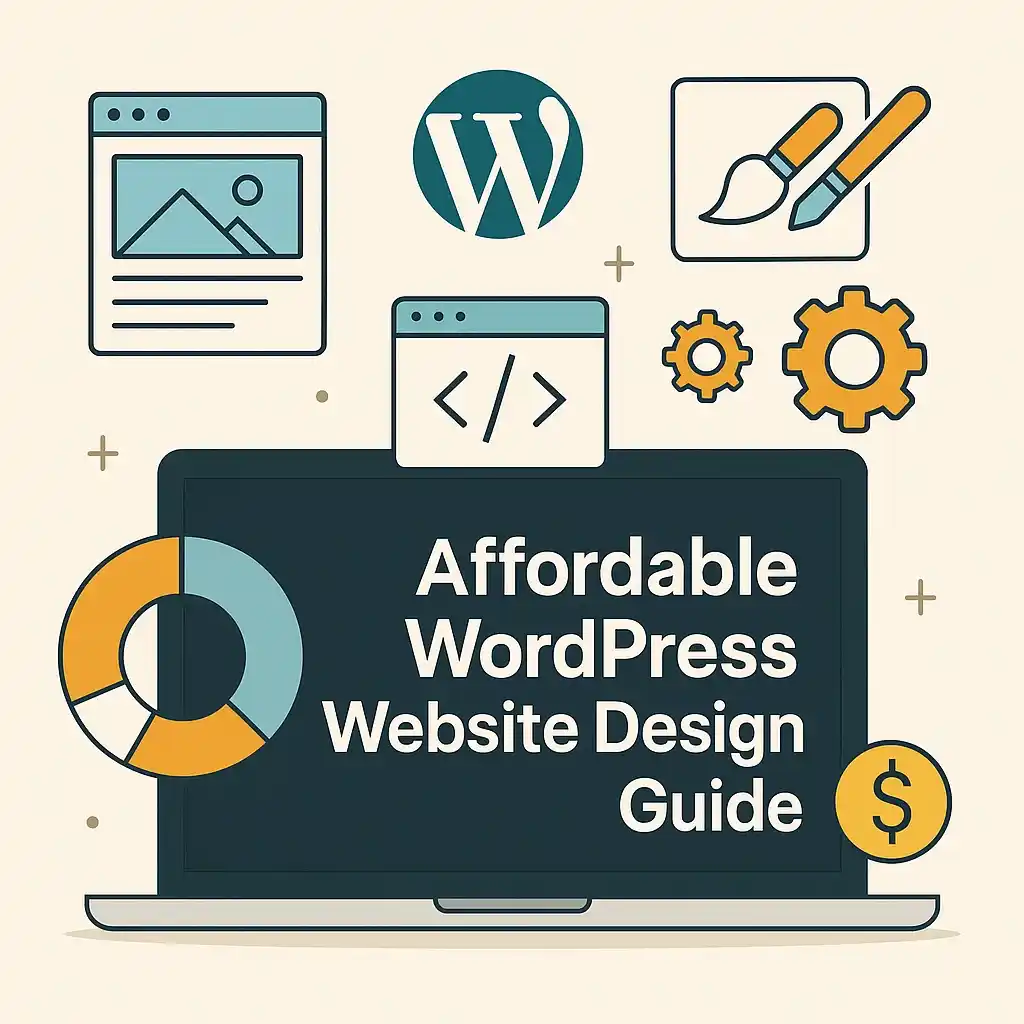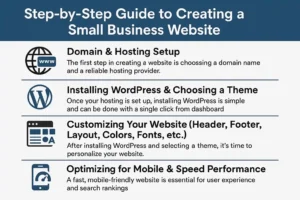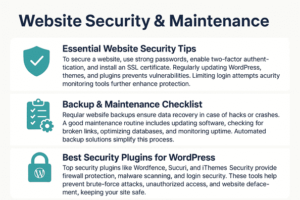
Introduction
In today’s digital age, having an online presence is crucial for small businesses to compete and grow. An affordable WordPress website can be the key to unlocking opportunities for small business owners. With its user-friendly interface, extensive customization options, and cost-effectiveness, WordPress provides the perfect platform for small businesses to build a professional website that attracts customers and boosts their online visibility.
What is Affordable WordPress Website Design?
Affordable WordPress website design refers to creating a fully functional, visually appealing website using WordPress at a reasonable cost. This design process is often budget-friendly while still offering professional results, thanks to the wide range of themes, plugins, and tools available on the WordPress platform. Small businesses can get a website that not only looks great but also functions smoothly without breaking the bank. It’s the ideal solution for entrepreneurs looking to establish their brand online with limited resources.
Why Small Businesses Need a Website?
A website acts as the digital storefront for any small business, enabling them to reach a broader audience and build credibility. It’s no longer optional but a necessity for small businesses to stay competitive. With a website, customers can learn more about your products or services, find your contact information, and make purchases online. It establishes trust and professionalism, which helps attract and retain customers. Moreover, it allows businesses to be visible 24/7, creating more opportunities for growth and success.
Benefits of Using WordPress for Small Business Websites
WordPress is one of the most popular platforms for small business websites, offering numerous advantages. Firstly, it is cost-effective and easy to set up, making it a perfect choice for businesses with limited budgets. Additionally, WordPress is highly customizable, allowing businesses to tailor their websites to their unique needs. With a large selection of plugins and themes, WordPress enables businesses to add new features, such as e-commerce, blogs, and customer feedback systems, all while maintaining a professional look and feel. It also offers strong SEO capabilities to help businesses rank higher in search engine results, driving more traffic to their site.
Choosing the Right Platform & Hosting
Selecting the right platform and hosting is crucial for building a reliable, fast, and secure WordPress website. Affordable hosting solutions ensure small businesses get the best performance without overspending.
Best Hosting Providers for Affordable WordPress Websites
Top hosting providers like Bluehost, Namecheap, Siteground, Godaddy, Hostinger, and Cloudways offer budget-friendly plans with excellent speed and security. Free WordPress hosting options exist but come with limitations, such as slow performance, ads, and restricted features.
Self-hosted vs. Free WordPress Hosting: Which One to Choose?
Self-hosted WordPress (via platforms like Bluehost or Cloudways) offers full control, customization, and better performance. Free hosting is suitable for personal projects but lacks essential features like security, scalability, and professional branding.
How Much Should You Pay for a Small Business Website?
The cost of running a small business website varies based on hosting, themes, and plugins. Basic hosting can cost around $3-$10 per month, while premium themes and essential tools may add extra costs. Budgeting wisely ensures long-term success.
Essential Website Design Guidelines
Creating a well-designed website is crucial for ensuring a positive user experience and achieving business success. A website should be visually appealing, easy to navigate, and optimized for performance. Following structured design principles and best practices can help small businesses create an effective website that attracts and retains visitors.
Website Design Best Practices Checklist
A well-structured website follows a set of best practices to enhance usability and engagement. These include mobile responsiveness, fast loading speed, clear navigation, high-quality content, and SEO optimization. Consistency in branding, an intuitive layout, and accessibility features also play a vital role. A well-designed website ensures visitors can easily find what they need without frustration.
10 Principles of Good Website Design
Good website design follows key principles that enhance usability and aesthetics. These include simplicity, visual hierarchy, consistency, mobile-friendliness, easy navigation, fast load times, accessibility, user-centric content, SEO optimization, and a clear call to action. These principles work together to improve the user experience and encourage visitors to take desired actions.
How to Order a Website Design on Upwork?
5 Golden Rules of Web Design
Successful web design relies on five golden rules: keep it simple, ensure easy navigation, prioritize speed, use a mobile-friendly approach, and maintain consistent branding. A clutter-free layout with well-structured content makes it easier for visitors to engage with your website. Clear typography, optimized images, and an intuitive user interface also enhance overall effectiveness.
7 Major Steps to Designing a Website
Designing a website involves a step-by-step process that includes planning, wireframing, choosing a platform, selecting a design theme, developing content, testing, and launching. Each step ensures that the website is functional, visually appealing, and aligned with business goals. Proper execution of these steps results in a seamless user experience and a successful online presence.
7 C’s & 4 C’s of Website Design
The 7 C’s of website design focus on content, context, community, customization, communication, connection, and commerce. Meanwhile, the 4 C’s—clarity, consistency, credibility, and convenience—ensure a seamless experience for users. Combining these principles helps in crafting a website that is engaging, user-friendly, and optimized for conversions.
Website Design Guidelines Recommended by Google
Google recommends following essential design principles such as mobile-friendliness, fast loading times, structured data implementation, and a clean, user-friendly interface. Additionally, Google emphasizes core web vitals, security (SSL), and accessibility. Adhering to these guidelines not only improves user experience but also boosts search engine rankings, increasing website visibility.
WordPress Themes & Templates for Small Business
Choosing the right WordPress theme is crucial for creating a professional and functional website for your small business. A well-designed theme ensures a seamless user experience, improves website performance, and enhances brand credibility. Whether you need an affordable theme, an affiliate marketing theme, or a ready-made business template, there are plenty of options available.
Best Affordable WordPress Themes for Small Business
For small businesses looking for budget-friendly yet high-quality themes, options like Astra, OceanWP, and GeneratePress stand out. These themes offer excellent customization, fast performance, and SEO optimization without requiring advanced coding skills. Many of them come with pre-built templates, making it easy for business owners to set up a professional website quickly and efficiently.
Affiliate Marketing WordPress Themes (Free & Paid)
Affiliate marketers need themes that focus on conversions, speed, and user experience. Popular themes like ReHub, GeneratePress, and Astra Pro provide customizable affiliate-friendly layouts with built-in SEO features. Free themes such as Kadence and Neve also offer great options for beginners looking to start with minimal investment while maintaining a professional look.
Small Business Website Templates: Where to Find?
Small business owners can find high-quality website templates on platforms like ThemeForest, TemplateMonster, and Envato Elements. Additionally, WordPress theme repositories offer a range of free templates tailored for different industries. These templates help businesses quickly build a visually appealing and functional website without hiring a professional designer.
Website Builders & DIY Design Options
For small business owners looking to create a website without hiring a developer, website builders and DIY design tools offer an excellent solution. These platforms provide user-friendly interfaces, drag-and-drop functionality, and customizable templates, making it easier to build a professional website. Whether using Wix, WordPress, Shopify, or custom design tools like Figma and HTML, there are various options to suit different needs and budgets.
Best Website Builders for Small Business (Wix, WordPress, Shopify, Squarespace, etc.)
Website builders like Wix, WordPress, Shopify, and Squarespace provide easy-to-use solutions for small businesses. Wix offers a drag-and-drop editor with great design flexibility, while WordPress gives users full control with thousands of themes and plugins. Shopify is ideal for eCommerce businesses, offering built-in payment solutions. Squarespace is known for its sleek, designer-friendly templates that cater to creative businesses.
Is Wix Completely Free? Advantages and Disadvantages of Using Free Website Builders
Wix offers a free plan, but it comes with limitations, such as Wix-branded ads and a subdomain (e.g., yoursite.wix.com). Free website builders are great for beginners but lack essential features like custom domains, advanced SEO tools, and eCommerce capabilities. Paid plans provide better customization, branding, and professional functionality, making them a more viable option for business growth.
Website Design Guide Using Figma & HTML
Figma is a powerful design tool that allows users to create wireframes and prototypes before coding a website. It helps in visualizing layouts, UI elements, and branding. Once the design is finalized, developers can use HTML, CSS, and JavaScript to bring the design to life. This approach is perfect for businesses that need custom-built websites with unique branding and advanced functionality.
Step-by-Step Guide to Creating a Small Business Website

Building a professional small business website requires a structured approach, from securing a domain to optimizing for speed and mobile usability. By following a step-by-step guide, business owners can create a functional, visually appealing, and high-performing website that enhances their online presence and drives customer engagement.
Domain & Hosting Setup
The first step in creating a website is choosing a domain name and a reliable hosting provider. Your domain name should be short, memorable, and relevant to your business. Hosting services like Bluehost, SiteGround, and Hostinger provide affordable plans with excellent performance, security, and customer support to ensure smooth website operation.
Installing WordPress & Choosing a Theme
Once your hosting is set up, installing WordPress is simple and can be done with a single click from your hosting dashboard. Next, selecting the right theme is crucial for design and functionality. Popular options like Astra, OceanWP, and GeneratePress offer customizable templates, responsive layouts, and built-in SEO features, making them ideal for small businesses.
Customizing Your Website (Header, Footer, Layout, Colors, Fonts, etc.)
After installing WordPress and selecting a theme, it’s time to personalize your website. Customizing the header, footer, layout, colors, and fonts helps align the website with your brand identity. Most themes come with built-in customization options or page builders like Elementor, allowing you to create a unique and professional-looking website without coding knowledge.
Adding Essential Pages (Home, About, Services, Contact, Blog, etc.)
Every business website should have key pages to provide visitors with important information. The Home page serves as the first impression, while the About page tells your story. The Services page outlines your offerings, and the Contact page provides ways for customers to reach you. If content marketing is part of your strategy, a Blog section can be a great addition.
Optimizing for Mobile & Speed Performance
A fast, mobile-friendly website is essential for user experience and search rankings. Use responsive themes, compress images, enable caching, and use a Content Delivery Network (CDN) to improve load times. Google’s Core Web Vitals can help monitor performance, ensuring your website meets modern speed and usability standards for a seamless browsing experience across devices.
Cost of Running a Small Business Website
Running a small business website involves more than just the initial setup; there are ongoing costs to consider. From domain registration to hosting, design, maintenance, and marketing, understanding these expenses helps business owners plan their budgets effectively. Proper cost management ensures you get the best value while maintaining a professional online presence.
How Much Does It Cost to Run a Small Business Website?
The cost of running a small business website varies based on factors like hosting, domain registration, and design. Typically, a basic website costs between $50 to $300 per year, while advanced features or eCommerce functionality can increase the price to $500 or more. Expenses include domain renewal, hosting fees, premium themes, plugins, and security tools.
Hidden Costs & How to Save Money on Website Design
Many business owners overlook hidden costs like premium plugins, SSL certificates, site backups, and maintenance fees. To save money, consider using free themes, shared hosting, and open-source tools. Bundled hosting plans, annual billing options, and DIY website builders can further reduce costs while maintaining a professional and high-performing website.
SEO & Marketing Strategies for Small Business Websites
A strong SEO and marketing strategy is essential for small business websites to attract visitors and generate leads. By optimizing for search engines, leveraging local SEO, and implementing content marketing, businesses can improve their online presence and drive more conversions.
Basic SEO Checklist for Small Business Websites
A well-optimized website follows SEO best practices like using keyword-rich titles, meta descriptions, fast loading speeds, and mobile responsiveness. Proper internal linking, alt text for images, and high-quality content help improve rankings and attract more organic traffic.
Local SEO & Google My Business Setup
For small businesses targeting local customers, setting up Google My Business (GMB) is essential. Optimizing business listings with accurate contact details, customer reviews, and location-based keywords improves visibility in local search results and Google Maps.
Content Marketing Strategies (Blogs, Lead Magnets, etc.)
Creating valuable content like blog posts, ebooks, and free resources helps build brand authority and attract potential customers. Lead magnets, such as downloadable guides or email newsletters, encourage visitors to engage and convert into loyal customers.
How to Monetize a Small Business Website?
Monetization strategies include offering services, selling digital products, displaying ads, and using affiliate marketing. Subscription-based content, sponsored posts, and eCommerce integration can also generate additional revenue while adding value to your audience.
Website Security and Maintenance

Website security and maintenance are crucial for protecting user data and ensuring smooth performance. Regular updates, backups, and security measures help prevent cyber threats and keep your website running efficiently.
Essential Website Security Tips
To secure a website, use strong passwords, enable two-factor authentication, and install an SSL certificate. Regularly updating WordPress, themes, and plugins prevents vulnerabilities. Limiting login attempts and using security monitoring tools further enhance protection.
Backup & Maintenance Checklist
Regular website backups ensure data recovery in case of hacks or crashes. A good maintenance routine includes updating software, checking for broken links, optimizing databases, and monitoring uptime. Automated backup solutions simplify this process.
Best Security Plugins for WordPress
Top security plugins like Wordfence, Sucuri, and iThemes Security provide firewall protection, malware scanning, and login security. These tools help prevent brute-force attacks, unauthorized access, and website defacement, keeping your site safe.
Conclusion & Final Recommendations
A well-designed website is a powerful asset for any small business, helping to establish credibility, attract customers, and drive growth. Investing in a professional, optimized site ensures long-term success in today’s digital landscape.
Is It Worth Having a Website for a Small Business?
Yes, a website is essential for brand visibility, customer trust, and business growth. It provides 24/7 accessibility, allows online marketing, and helps businesses compete in the digital space. Even a simple website can significantly impact revenue and customer engagement.
Can I Run a Business Without a Website?
While it’s possible to run a business without a website, it limits growth potential. Social media platforms and online marketplaces help, but a website gives complete control over branding, content, and customer interactions, making it a long-term necessity.
Best Resources & Next Steps
To build and maintain a successful website, explore WordPress guides, SEO tutorials, and security best practices. Invest in quality hosting, use reliable plugins, and continuously update your site. Small business owners should also leverage digital marketing to maximize their website’s impact.
Frequently Asked Questions
Why is having a website important for a small business?
A website boosts credibility, increases brand visibility, and provides a platform for online marketing and customer engagement, essential for business growth.
What are the benefits of using WordPress for small business websites?
WordPress is cost-effective, customizable, SEO-friendly, and offers a wide range of themes and plugins to suit business needs, helping attract more visitors.
Should I choose self-hosted WordPress or free WordPress hosting?
Self-hosted WordPress provides full control, better performance, and scalability, whereas free hosting lacks essential features like security and professional branding.
How much does it cost to run a small business website?
The cost typically ranges from $100 to $300 per year for basic websites, while eCommerce or advanced features may cost $500 or more annually.
What are the best security practices for a WordPress website?
Use strong passwords, enable two-factor authentication, install an SSL certificate, and keep WordPress, themes, and plugins up to date to ensure security.

Why Small Businesses Need a Website - SEO Expert Parvez
April 7, 2025[…] Costs: A website requires regular updates and maintenance to keep it running smoothly. You may need to pay for hosting, domain renewal, or hiring a developer for […]